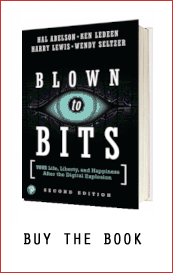Excerpts from Chapter 1: Digital Explosion: Why Is It Happening, and What Is at Stake?
The Explosion of Bits, and Everything Else … The Koans of Bits … Good and Ill, Promise and Peril
The world changed very suddenly. Almost everything is stored in a computer somewhere. Court records, grocery purchases, precious family photos, pointless radio programs…. Computers contain a lot of stuff that isn’t useful today but somebody thinks might someday come in handy. It is all being reduced to zeroes and ones‚ ”bits.” The bits are stashed on disks of home computers and in the data centers of big corporations and government agencies. The disks can hold so many bits that there is no need to pick and choose what gets remembered. …
Your computer successfully creates the illusion that it contains photographs, letters, songs, and movies. All it really contains is bits, lots of them, patterned in ways you can’t see.… Naral Pro-Choice America … wanted to form a text messaging group to send alerts to its members. Verizon decided not to allow it, citing the “controversial or unsavory” things the messages might contain.
… Had Naral simply wanted telephone service or an 800 number, Verizon would have had no choice. Telephone companies were long ago declared “common carriers.” Like railroads, phone companies are legally prohibited from picking and choosing customers from among those who want their services. In the bits world, there is no difference between a text message and a wireless phone call. It’s all just bits, traveling through the air by radio waves. But the law hasn’t caught up to the technology. It doesn’t treat all bits the same, and the common carriage rules for voice bits don’t apply to text message bits. …
In 2006, a 13-year-old girl, Megan Meier of Dardenne Prairie, Missouri, made friends online with a 16-year-old boy named “Josh.” When “Josh” turned against her, writing “You are a bad person and everybody hates you…. The world would be a better place without you,” Megan committed suicide. … Along with its dazzling riches and vast horizons, the Internet has created new manifestations of human evil‚ some of which, including the cyber-harassment Megan Meier suffered, may not be criminal under existing law. In a nation deeply committed to free expression as a legal right, which Internet evils should be crimes, and which are just wrong? …
The information story is full of examples of unperceived changes followed by dislocating explosions. … In early 1997, Kodak stock hit a record price…, “fueled by healthy film and paper sales” …. But by 2007, … cameras had become little computers. The company that was once synonymous with photography was a shadow of its former self. …
The massive databases challenge our expectations about what will happen to the data about us. Take something as simple as a stay in a hotel. …. Because the keycards can be deactivated instantly, there is no longer any great risk associated with losing your key…. On the other hand, the hotel now has a record, accurate to the second, of every time you entered your room, used the gym or the business center, … every cocktail and steak you charged to the room, which other rooms you phoned and when, and the brands of tampons and laxatives you charged at the hotel’s gift shop. This data might be merged with billions like it, analyzed, and transferred to the parent company, which owns restaurants and fitness centers as well as hotels. It might also be lost, or stolen, or subpoenaed in a court case.

